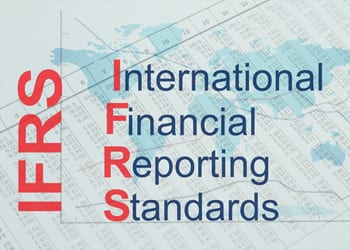Search for your desired courses here
International Financial Reporting Standards (IFRS) Training Course in Dubai
Overview of the IFRS Training Course
IFRS Training Course offers a comprehensive introduction and updates to the field of International Financial Reporting and International Financial Reporting Standards, tracing the history of the International Accounting Standards Board (IASB) from its early roots through to the recent changes and future developments.
Structured in a readable and user-friendly format, the course distills key information into easy-to-digest bullet points, provides useful summaries, and examines, topic-by-topic, specific standards. Frequently asked questions and answers expand on the covered issues; case studies are based on real-life examples.
Exercises, multiple-choice questions, and sample answers are available to test your knowledge. They will guide you as you progress through the course and help you achieve the IFRS Certification.
Primary course objectives:
- To help you understand how International Financial Reporting Standards (IFRS) are used around the world
- To explain the workings of the IFRSF/IASB and how these are being changed
- To examine the fundamental requirements of IFRS on a standard-by-standard basis for the benefit of preparers, auditors and users of financial statements
- To provide guidance on how to use IFRS in practice with the aid of questions, cases, and exercises
- To explain the fundamentals of IFRS qualification
We provide guidance on how to achieve IFRS Certification
On completion of the IFRS Course, candidates should be able to:
- Understand and explain the structure of the framework of international accounting
- Apply relevant financial reporting standards to key elements of financial reports
- Identify and apply disclosure requirements for companies in financial reports and notes
- Prepare group financial statements (excluding group cash-flow statements) including subsidiaries, associates and joint ventures.
Who needs the IFRS Training Program?
The target audience is professional accountants and auditors, qualified by their national accounting standards. However, it is possible for those with experience but no formal qualifications in accounting and auditing to register for this certificate. Those who want a better IFRS Qualification/ IFRS Certification can also apply for this certificate.
Learning Outcome of IFRS Training
- IFRS Course will help you to understand and explain the structure of the framework of international accounting
- Apply relevant financial reporting standards to key elements of financial reports
- Identify and apply disclosure requirements for companies in financial reports and notes
- Prepare group financial statements (excluding group cash-flow statements) including subsidiaries, associates and joint ventures
Detailed Course Content:
CertIFRS - Certificate in International Financial Reporting
-
- The International Accounting Standards Board and IFRS Accounting Standards
- The origins of the International Accounting Standards Board (IASB®)
- The structure of the IFRS Foundation
- International Accounting Standards (IAS® Accounting Standards), and International Financial Reporting Standards (IFRS® Accounting Standards) that are currently in issue
- The Conceptual Framework for Financial Reporting.
-
- IFRS Accounting Standards - global convergence and continued development
- A brief summary of the adoption of International Financial Reporting Standards (IFRS® Accounting Standards) in different jurisdictions
- The growth of the International Accounting Standards Board (IASB®)
-
- Revenue, presentation and profit
- IAS 1 Presentation of Financial Statements
- IFRS 15 Revenue from Contracts with Customers
- IAS 8 Accounting Policies, Changes in Accounting Estimates and Errors.
-
- Accounting for non-current assets
- IAS 16 Property, Plant and Equipment
- IAS 40 Investment Property
- IAS 23 Borrowing Costs
- IFRS 5 Non-current Assets Held for Sale and Discontinued Operations
-
- Accounting for assets, impairments and grants
- IAS 38 Intangible Assets
- IAS 36 Impairment of Assets
- IAS 20 Accounting for Government Grants and Disclosure of Government Assistance
- IAS 2 Inventories
-
- Accounting for leases and specialised assets
- IFRS 16 Leases
- IAS 41 Agriculture
- IFRS 6 Exploration and Evaluation of Mineral Resources
-
- Accounting for financial instruments
- IAS 32 Financial Instruments: Presentation
- IFRS 9 Financial Instruments
- IFRS 7 Financial Instruments: Disclosures
- IFRS 13 Fair Value Measurement
- IFRS 4 and IFRS 17 Insurance Contracts
-
- Accounting for liabilities
- IAS 37 Provisions, Contingent Liabilities and Contingent Assets
- IAS 19 Employee Benefits
- IAS 12 Income Taxes
- IFRS 2 Share-based Payment
-
- Group accounting – part 1
- IFRS 10 Consolidated Financial Statements
- IAS 27 Separate Financial Statements
- IFRS 3 Business Combinations
-
- Group accounting – part 2
- IFRS 11 Joint Arrangements
- IAS 28 Investments in Associates and Joint Ventures
- IFRS 12 Disclosure of Interests in Other Entities
- IAS 21 The Effects of Changes in Foreign Exchange Rates
- IAS 29 Financial Reporting in Hyperinflationary Economies
-
- Disclosure standards and first-time adoption
- IAS 7 Statement of Cash Flows
- IFRS 8 Operating Segments
- IAS 24 Related Party Disclosures
- IAS 33 Earnings Per Share
- IAS 34 Interim Financial Reporting
- IAS 10 Events after the Reporting Period
- IFRS 1 First-time Adoption of IFRS
-
- IFRS Accounting Standards and other reporting frameworks
- The IFRS for SMEs Accounting Standard
- The FASB and US GAAP
- Principle differences between IFRS Accounting Standards and US GAAP
- Indian GAAP
Exam Fees:
ACCA Members = £115
Non-ACCA Members = £145
Principal differences between key national GAAP and IFRS Proposals for change
DiplIFRS - Diploma in International Financial Reporting-IFRS Qualification
A. International sources of authority
- The International Accounting Standards Board (IASB) and the regulatory framework
- Fundamental ethical and professional principles
B. Elements of financial statements
- Revenue recognition
- Property, plant and equipment
- Impairment of assets
- Leases
- Intangible assets and goodwill
- Inventories
- Financial instruments
- Provisions, contingent assets and liabilities
- Employee benefits
- Tax in financial statements
- The effects of changes in foreign currency exchange rates
- Agriculture
- Share-based payment
- Exploration and evaluation expenditures
- Fair value measurement
C. Presentation of financial statements and additional disclosures
- Presentation of the statement of financial position, the statement of profit or loss and other comprehensive.
- Income and the statement of changes in equity
- Earnings per share
- Events after the reporting period
- Accounting policies, changes in accounting estimates, and errors
- Related party disclosures
- Operating segments
- Reporting requirements of small and medium-sized entities (SMEs)
D. Preparation of external financial reports for combined entities, associates, and joint arrangements
- Preparation of group consolidated external reports
- Business combinations – intra-group adjustments
- Business combinations – fair value adjustments
- Business combinations – associates and joint arrangements
- Complete disposal of shares in subsidiaries
Excluded topics
The following topics are expressly excluded from the syllabus:
- Complex group structures, including sub-subsidiaries or mixed groups and foreign subsidiaries
- Step acquisitions, partial disposal of subsidiaries, and group re-constructions
- Financial statements of banks and similar financial institutions
- Preparation of statements of cash flow (single company and consolidated)
- Preparation of interim financial statements
- Accounting for insurance entities
- International financial reporting exposure drafts and discussion papers
- The global public sector perspective
- Multi-employer benefit schemes
- Information reflecting the effects of changing prices and financial reporting in hyperinflationary economies
Key areas of the syllabus
- The key topic area headings are as follows:
- International sources of authority
- Elements of financial statements
- Presentation of accounts and additional disclosures
- Preparation of external reports for combined entities, associates, and joint arrangements.
To learn more about the International Finance Reporting Standard IFRS Certification body, click here
Zabeel offers professional Training for IFRS Qualification and other Finance and accounting courses
Frequently Asked Question
- IFRS - What does IFRS stand for in financial accounting?
- IFRS Certification in Dubai- How do I get IFRS certified?
- IFRS course in Dubai- What is IFRS course fees in Dubai
- IFRS Course Material -How can I study the IFRS course?
- Cia eligibility course -How do you become CIA certified?
- CIA Exam-What is CIA (Certified Internal Auditor) exam?
- CMA Exam-How challenging is CMA examination?
- Finance for non-finance manager-Importance of finance for non- financers?
- Finance for non-finance manager certificate-Who are non-financials?
- CIMA Case study- What is CIMA case study exam?
Connect with us on Social Media








